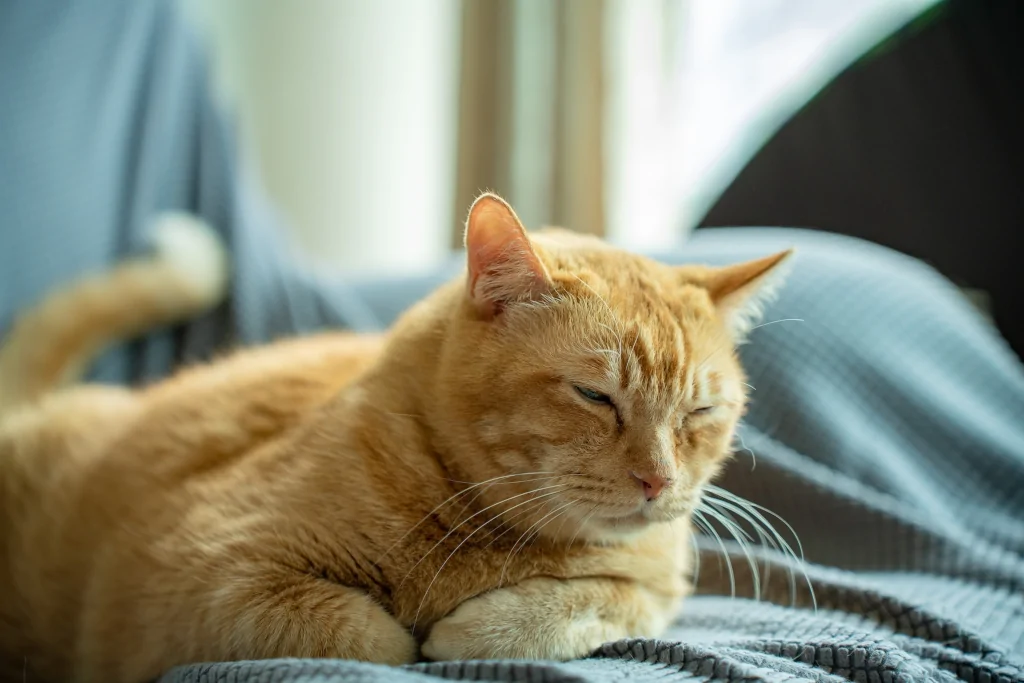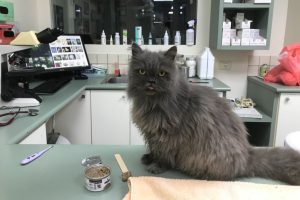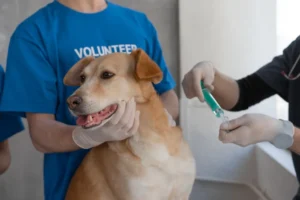Taking your loyal feline to the vet for vaccinations is a responsible pet owner’s duty, but it can sometimes lead to concerns about how your cat might react.
We’re here to ease those worries and guide you through the process, from understanding the importance of post-vaccine monitoring to recognizing the difference between mild and severe reactions.
In this blog post, we’ll arm you with the knowledge to care for your cat both during and after their vaccinations. Let’s dive in!

Post-vaccine Monitoring, Why Bother?
Post-vaccine monitoring is essential for your cat’s well-being, even if it might seem like an extra task on your to-do list.
Monitoring your feline friend after their vaccinations helps you catch any potential reactions early on, ensuring your pet receives the proper care should they experience any side effects.
Additionally, being aware of your cat’s behavior and health post-vaccination allows you to provide valuable feedback to your vet, helping them make informed decisions about future vaccine schedules.
Remember, a little vigilance goes a long way in keeping your cat safe and sound.
Mild Reactions: What’s Normal for Vaccinated Cats?
In the hours and days following your cat’s vaccination, it’s not uncommon for them to experience some mild reactions. These are typically normal and no cause for alarm.
Some of the expected mild reactions in vaccinated cats include:
These mild reactions generally resolve on their own within a few days. However, if any of these symptoms persist or worsen, it’s a good idea to consult your veterinarian for guidance.
Severe Reactions: When Should You Call the Vet?
While mild reactions are relatively common after vaccinations, severe reactions are rare but require immediate attention. Knowing the signs of a severe reaction can help you act quickly and get your cat the care they need.
Reach out to your veterinarian if you notice any of the following symptoms:
Remember, it’s always better to err on the side of caution. If you’re ever unsure about your cat’s condition, don’t hesitate to contact your vet for guidance.
They’re there to help you and your feline friend navigate the vaccination process with confidence and ease.
Reducing Your Cat’s Risk of Vaccine Reactions
While it’s not always possible to prevent vaccine reactions entirely, there are steps you can take to minimize the risk for your feline friend.
One key aspect is working closely with your veterinarian to develop a personalized vaccination plan that takes your cat’s age, health, and lifestyle into account. This can help ensure they only receive the necessary vaccines, reducing the chances of an adverse reaction.
Another important factor is maintaining your cat’s overall health. A strong immune system and good general health can help your cat better tolerate vaccinations. On the other hand, a cat with an immunosupressed system may need special plan and consideration.
Make sure they receive a balanced diet, regular exercise, and routine veterinary check-ups to keep them in tip-top shape.
Finally, be vigilant about monitoring your cat after vaccinations. If your cat has had reactions in the past, inform your veterinarian so they can take any necessary precautions.
By taking these steps, you can help make the vaccination experience as safe and stress-free as possible for your beloved feline companion.
Caring for Your Cat After Vaccination
After your cat has been vaccinated, providing them with a comfortable and supportive environment is key to a smooth recovery. Here are a few practical tips to help your feline friend feel their best post-vaccination:
Offer a quiet space.
Your cat may be feeling a bit out of sorts after their appointment, so give them a quiet and cozy spot where they can relax and recuperate. Add a familiar blanket or toy to help them feel more at ease in their resting area.
Keep an eye on hydration.
Make sure your cat has access to fresh water, as proper hydration is essential for their overall well-being, especially if they’re experiencing mild side effects. Consider placing additional water bowls in various locations to encourage more frequent drinking.
Monitor interactions with other pets.
If you have other animals in your household, it’s a good idea to supervise their interactions with the recently vaccinated cat. This helps ensure your recovering pet doesn’t get too stressed or overstimulated. You could also consider temporarily separating them during the initial recovery period to minimize any disturbances.
Be gentle.
Remember that your cat’s injection site might be sore or tender, so be cautious when handling them, and avoid applying pressure to the area. If you need to pick up your cat, make sure to support their body weight evenly, and avoid lifting them by the scruff or under their front legs.
By following these suggestions, you can help your cat bounce back quickly from their vaccinations and return to their usual playful selves in no time!
When to Contact Your Vet for a Follow-up
As your cat’s loving guardian, you’re in the best position to notice any unusual behavior or symptoms that might warrant a follow-up with your veterinarian.
Trust your instincts, and don’t hesitate to reach out if you have any concerns. Building a strong relationship with your vet is essential for the long-term health and happiness of your kitty.
By staying vigilant, asking questions, and working together with your vet, you can create a safe and nurturing environment that allows your cat to thrive.
So, keep an open line of communication and remember, your vet is always there to guide and support you on this journey of caring for your cherished purring pal.
FAQs
How soon after vaccination can reactions occur?
Reactions can happen within minutes to hours, but some may take days to develop. Monitor your cat closely for 48 hours.
Can my cat get sick from the vaccine itself?
While vaccines can cause mild reactions, they’re generally safe and designed to protect your cat from more severe illnesses, not to cause harm.
Are vaccine reactions more common in kittens?
Kittens may be more sensitive to vaccine reactions, but proper vaccination schedules and monitoring help minimize risks.
Can I give my cat medication to prevent vaccine reactions?
Consult your vet before giving any medication, as they can provide guidance on managing reactions and ensuring your cat’s safety.
Alex, a passionate animal lover, has experience in training and understanding animal behavior. As a proud pet parent to two dogs and three cats, he founded AnimalReport.net to share insights from animal experts and expand his knowledge of the animal kingdom.




